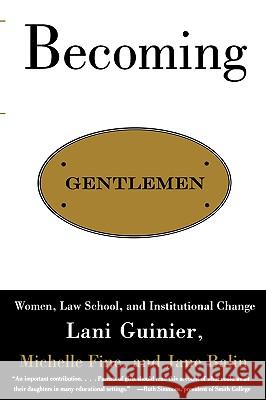Becoming Gentlemen: Women, Law School, and Institutional Change » książka
Becoming Gentlemen: Women, Law School, and Institutional Change
ISBN-13: 9780807044056 / Angielski / Miękka / 1997 / 192 str.
As a student at Yale Law School in 1974, Lani Guinier attended a class with a white male professor who addressed all of the students, male and female, as "gentlemen." To him the greeting was a form of honorific. It evoked the traditional values of legal education to train detached, "neutral" problem solvers. To her it was profoundly alienating.
This volume tells the story of legal education through the experiences of women. It chronicles the disappointments of women as they enter previously male-dominated institutions and, to a surprising extent, remain isolated, marginalized, and dissatisfied. It shows how the hierarchical, competitive approach to training lawyers inhibits many women and some men.
But the book is a critique, not a complaint. The authors argue that conventional approaches to legal education do not educate or evaluate all students based on their potential to either learn or do the job of good lawyers, nor do these approaches explore the range of skills students could bring to the profession.
In questioning what it means to be qualified, what a fair goal in education might be, and what we can learn from diversity, Becoming Gentlemen offers invaluable lessons not only for education but for society in general.
"Becoming Gentlemen is an important contribution to the compelling body of literature that demonstrates that gender discrimination in our colleges and professional schools is often subtle but insidious and even dangerous. Guinier, Fine, and Balin reveal the educational practices that often undermine the success of our most gifted and ambitious female students. Parents ofgirls should read this account of what could await their daughters in many educational settings."
--Ruth Simmons, President of Smith College
"[Lani Guinier] confronts issues of race, political participation, and democracy forcefully and provocatively, invigorating the dialogue on these issues."
--U.S. Senator Bill Bradley
"There is no doubt that [Guinier's] powerful voice will produce good consequences for our nation and our world."
--Cornel West, author of Race Matters
"An important and startling work by a provocative national figure."
--Kirkus Reviews











